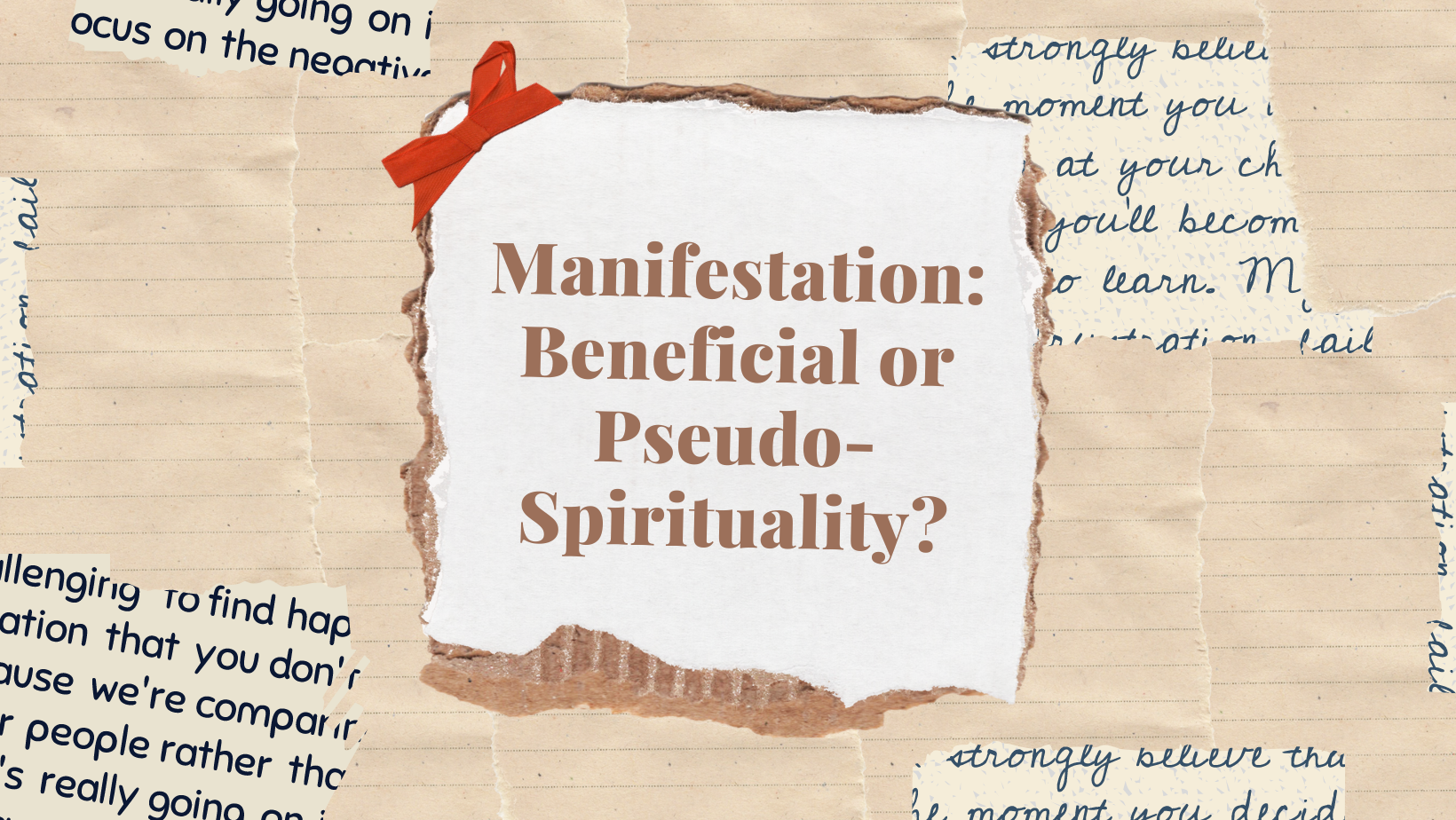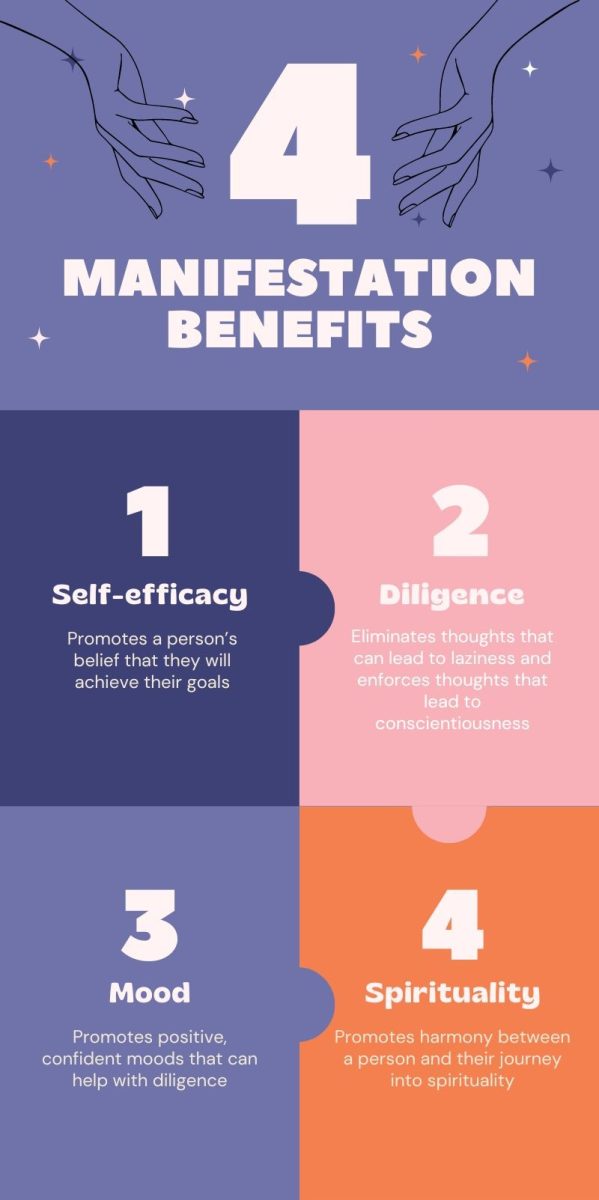
Opposing Viewpoints

The practice of manifestation dates back to the late 19th century when philosophers and spiritual thinkers from different devotions agreed on the power of positive energies. This practice earned the title of the New Thought movement. Countless believers in manifestation continue to preach that the movement truly continues to better lives. Unfortunately, the wrong ways of manifesting frequently lead to ignoring reality and maintaining an unhealthy mindset.
“I have heard of manifestation. I remember it being a really big thing on social media in 2020. I would see so many videos of people claiming they were manifesting significant others, then I would see comments debunking them. Later on, I would see a whole new video of the same creator saying that they didn’t actually manifest their partner; they were already really close to dating, and she just decided to make a silly TikTok about her jokingly manifesting a partner,” junior Zoe Williams said.
Manifestation entails practicing thinking thoughts to transform them into truth. Those who manifest and claim that manifesting does not work for them due to not maintaining a positive mindset. These believers then search for sources that offer advice on how to feel additionally positive. On these sites, followers may find their usual manifesting process along with comments on their negative thoughts. This proves that manifestation leads to wasted time, hope and energy due to all the criteria a devotee of manifestation must meet to achieve a certain goal in the immediate or distant future.
The method of writing affirmations to manifest leads to a negative way of life stemming from delusion, which followers do not recognize, due to their belief that their practice of affirming will work. Journaling remains a better and healthier option for affirming and manifesting a goal rather than the unhealthy ways of repeatedly copying down the same sentences. Healthy journaling allows the writer to detail their dreams without seeming so robotic with writing a repeated list.
As a punishment, teachers force students to write down a way they will change on paper or a board in the classroom. This method ensures that a student’s learning will remain permanently stuck in his or her mind, similar to manifestation. This method does not help a person achieve a personal goal in any way, shape or form.
Although manifestation seems to maintain the attention of various manifesters by offering hope, only 27.9% of Americans practice manifestation. Fortunately, people within that percentage believe in the healthier side of manifesting: visualizing an outcome and working toward it.
No amount of positive thinking will help one achieve a dream unless one works toward it. Manifestation followers who obsess over ways they hope their lives will change due to their manifestations, truly believe in their practice but unfortunately will begin to realize their unhealthy lifestyles once their dreams do not come true. Believing ideal lifestyles will become true based on writing them down several times leads to an obsessive and unhealthy lifestyle. Numerous believers in the method of affirming most likely experience the placebo effect, where people believe improvement or change will come to them based on their trust in a treatment or in this case, manifestation.
“I think that manifesting is a lot like the placebo effect. They both entail believing something will happen or is happening immediately. I think that both are really unhealthy, especially the placebo effect. Some people genuinely claim that their placebo medication is working on them. I think manifesting is more of a slow takeover though. When people plan times to manifest within their schedule, I think that’s when the behavior becomes a little bit concerning,” junior Aubrey McPherson said.
Although manifestation holds a minor amount of followers, there remains a right and wrong way to manifest which could extremely affect one’s life. To manifest properly or healthily, believers in manifestation should understand the correct way to manifest to fully achieve their goals: journaling or creating a dream board without obsessing over a fully planned ideal life.

Dating back to ancient Rome and Greece, people have utilized manifestation as a practice based on spirituality. Those who practice manifestation believe that the human consciousness and spirit hold an energy that can connect with the universe in various ways, including the ability to turn aspirational thought into truth. Although scientific theory cannot simply determine whether or not the human spirit holds an innate connection to fate, manifestation serves as an effective method for spiritualists to boost one’s self-efficacy when practiced without the influence of false manifestation.
“I do believe in manifestation; everyone I’ve seen who has a manifestation board has clear and attainable goals. They are working hard toward and [it] has never failed them. Because I believe in the thought that words and actions have power, manifesting, to me, is like speaking your goals into existence and it’s easier to work towards whatever you want to achieve,” magnet senior Abigail Rigg said.
Across the world, manifestation stands as a belief system that people practice as a part of their religious or spiritual journey, personal indulgence or to test theories of determinism. New Thought, a movement that focuses on bringing the practices of ancient cultures and spiritualities into the modern day, encompasses various metaphysical ideals, including the law of attraction—the key to manifestation. The law of attraction explains that optimistic thoughts come with positive results, and vice versa.
“The Secret,” a 2006 novel by Rhonda Byrne based on New Thought theories of manifestation, morphed into a center of significant debate between people of all faiths and beliefs. The idea of manifestation as a genuine discernment of a way of life became a common practice. The book fueled a new age of manifestation books and theories that not only New Thought enthusiasts believed in, but even practitioners of God-based faiths began to acknowledge. As assumed, however, manifestation became controversial as disbelievers understandably began questioning the theories of manifestation in new media.
After the release of “The Secret,” authors began misusing the ideals of manifestation to scam hopeful manifesters into buying books tainted with Western esotericist exclusionism. This mainly included authors taking the ideas of the law of attraction from Hindu and Buddhist theorists, changing its fundamentals, and creating false “get-rich-quick” books that assure readers that they will earn wealth and success by simply “believing.” This unfair usage of manifestation fueled a dispute against the law of attraction, labeling manifestation as fake spirituality.
“Unfortunately, most psychological scientists will tell you that these books are based on pseudoscience—they claim to be scientific and factual, but they’re not actually based on scientific evidence. So as a psychological scientist, I can’t, in good conscience, recommend these books. However, I feel like many psychologists throw out the baby with the bathwater when it comes to the idea of ‘manifestation.’ They’ll often say it’s junk science,” Doctor of Philosophy and well-being research consultant Tchiki Davis said.
Contrary to popular belief, new-wave manifestation tactics typically do not encompass true theories of the law of attraction. These pieces of media frequently use marketing tactics to state baseless theories the author created on a whim to increase sales. The criticizers of manifestation may not even dislike manifestation itself—they dislike the fake manifestation scams created by popular media.
Manifestation encompasses numerous aspects of success that work further than reading manifestation books. The practice also works as a spiritual method to help fuel a deep connection with oneself and the universe. One’s journey into manifestation will firstly include the understanding that their belief in other outside forms, such as a belief in a God or Gods, will likely contradict manifest theory. For example, suppose one believes in predestination and a God that controls all aspects of life. In that case, the idea that one’s spirit controls various elements of one’s life will contradict that person’s religion.
Whether one disagrees with its success rate, various psychologists have found manifestation beneficial for individuals looking to improve their self-efficacy. At its root, manifestation begins with discarding negative thoughts for positive ones. Positive thoughts can improve mood, optimism and diligence toward specific goals. These thoughts can improve one’s mental being, naturally helping one reach new goals with newfound diligence.
“Of course, we can manifest positive things in our lives—if we couldn’t then what would be the point of therapy, wellness interventions or any of the tools we use to help people? Research by Dr. Carol Dweck clearly shows that believing you can do something makes it more likely that you’ll successfully do it. That means that our beliefs about our ability to learn, grow, and succeed—our growth mindset—can indeed affect whether we effectively manifest what we desire,” Davis said.
Although people will continue not to believe in manifestation, there remain numerous aspects of other religions that also carry contradictions. Spiritualities and religious practices share continual inconsistencies. With over 4,000 documented religions practiced worldwide with varying ideas, absurdities and truths, inconsistencies will remain. Even when considering the disparities of the law of attraction, it remains a popular form of spirituality in which various people will continue to find prosperity.
Your donation will support the student journalists of North Cobb High School. Your contribution will allow us to purchase equipment and cover our annual website hosting costs.










